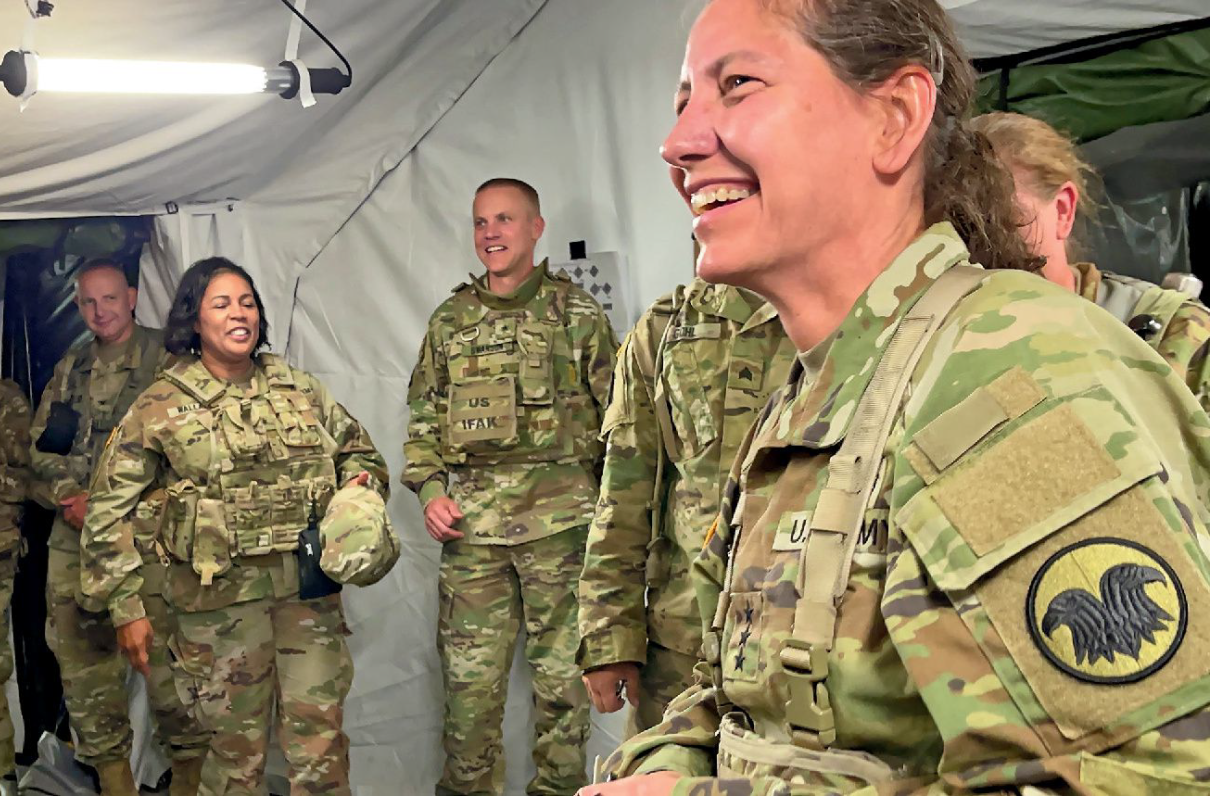(This article originally appeared in the March 2022 issue of Military Officer, a magazine available to all MOAA Premium and Life members. Learn more about the magazine here; learn more about joining MOAA here.)
Encouragement from leaders and raw determination took Lt. Gen. Jody Daniels, USA, from almost quitting ROTC to becoming the first woman chief of the Army Reserve.
She’s the 34th chief of the Army Reserve, and the ninth commanding general of U.S. Army Reserve Command, with some 200,000 soldiers and DoD civilians looking to her for leadership and guidance.
It’s not what she envisioned when she began Army ROTC at Carnegie Mellon University.
“I had no clue,” Daniels said, describing her career trajectory. “I almost quit
ROTC.”
Despite her misgivings, she stuck it out and was commissioned as an intelligence officer. That’s when her first boss encouraged her to continue her education and complete master’s and Ph.D. degrees.
Later in her career, another mentor told her if she didn’t apply to War College, she wouldn’t be eligible for general rank. She’d never thought about her future that far out before, she said.
“Because he had that … confidence in me, it changed how I looked at my future,” Daniels said.
Daniels recently spoke with Military Officer; the following interview has been edited for length and clarity.
Q. What are some of the Reserve Command’s missions?
A. The Army Reserve provides all the enablers to the active-duty force — around 120 different career fields. We have the preponderance of civil affairs for the force, as well as a significant portion of the Army’s engineers, military intelligence, military police, cyber, aviation, logisticians, and postal — all of those things that enable the active duty Army. Same thing with transportation. Same thing with medical. And then our lawyers and our chaplains are the predominant force that comes out of the Army Reserve.
[MOAA INTERVIEW: VA Secretary Denis McDonough on Toxic Exposure, COVID, and More]
Q. How do you compete with the private sector?
A. We don’t see it as “competing.” We think of it as sharing America’s best talent. Soldiers in the Army Reserve can keep their civilian job or attend college — serving at least one weekend a month and two weeks a year, usually within 90 minutes of home.
Another great thing about serving in the Army Reserve is that we can help soldiers find civilian employment — we have the Private Public Partnership Office, which helps out on that front. In addition to connecting soldiers and families with employment opportunities, there are all kinds of entrepreneurial venues and hiring events that we can link folks with — across the globe in many cases.
Finally, something very important to career advancement is building leadership skills. The Army is one of the few places where, even as junior leaders, you are leaders. … We also help you develop those leadership skills. We send you off to courses, we put you in leadership positions, and we coach and mentor. Those are very valuable skills that you can leverage in your civilian career.
[MOAA INTERVIEW: The Future of the USPHS Commissioned Corps]
Q. Sexual assault and sexual harassment seem to be a national discussion regularly. How does the Army Reserve support commanders and troops?
A. I was preparing to assume command when my predecessor directed a 100% stand-down, with a focus on refreshing the training to make sure that everybody gets it. Over time, the training had become a sort of check the block, throw up a PowerPoint exercise. But this is not the answer we’re seeking.
It’s more important to have tough conversations — leader-led small groups, with frank, honest, transparent discussions. Ask people questions about experiences. Then you know how they grew up, what they’ve experienced, what they expect of others, and how they want to be treated.
[MOAA INTERVIEW: VMI Superintendent on Empowering Young Leaders]
Q. Is that uncomfortable for some leaders to ask such direct, personal questions?
A. Yes, because sometimes the answers are hard to hear.
Helping leaders have these tough conversations was the first step … and then listening and seeing what actions needed to be taken. One of the things we did to ensure leaders were prepared to take appropriate steps was meet with our lawyers to make sure they understood the standards … so they could render good counsel to those leaders. We’ve now put in place a requirement that within the first 30 days of taking command, every commander has to have that one-on-one with their lawyer so they can find out about any open cases and quickly get up to speed on what’s going on in their command.
[MOAA INTERVIEW: Gen. Charles Q. Brown Jr., Air Force Chief of Staff]
Q. More women than ever are choosing to join the military. How do you hope to connect with women entering the military?
A. This is a tricky question because I spent so much of my time focusing on being an officer and a leader in whatever unit I was serving in — being an intelligence officer, being a civil affairs officer, being a professional. But, being a “first,” I have found myself counted among some incredible female trailblazers, and I think it’s great to help pave that path.
To the next generation coming up the ranks, whatever your gender or race, if you’re a junior leader looking to make a mark and rise above your peers — my advice to you is be professional. Stay focused on your career, take the tough jobs, put in the extra effort, and be an asset to your team.
Military Officer Magazine
Discover more interesting stories in MOAA's award-winning magazine.

